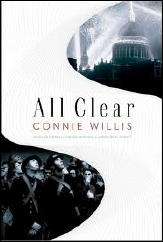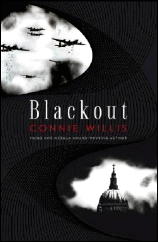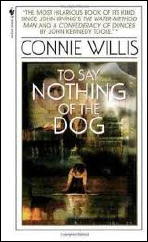Sat 19 Feb 2011
SF Review by Stan Burns: CONNIE WILLIS – All Clear.
Posted by Steve under Reviews , Science Fiction & Fantasy[5] Comments

CONNIE WILLIS – All Clear. Spectra, hardcover, October 2010; trade paperback, October 2011.
This is the second book in Willis’ story of the British home front during WWII; the first was Blackout. Originally written as one big novel, because of the length it was split into two novels by the publisher.
Between the two of them they are over 1200 pages long — and that is the major problem. There is just too much happening — too many characters, too many events, too many disappointments. The combined novel should have been titled The Perils of Polly, who is the main character in a cast of thousands. She keeps flitting from one disaster to another, just like Pauline in the movie.
In this novel, set in the same time traveling universe as Willis’ award winning Doomsday Book, three historians from 100 years in the future are trapped in England during WWII. For some reason the time gates that let them go back home at the end of their studies will not open.

Ellen had been trapped in a mansion caring for children shipped out of London when an epidemic of measles broke out and she was quarantined and missed her pickup date. Polly worked as a shop girl in London during the Blitz. Matt had been badly wounded at Dunkirk. The three had finally found each other, compared notes, and resolved to find a way home at the end of the first novel.
And in this novel that’s what they try to do — for over 600 pages, futilely trying to find other historians, put messages in newspapers, and desperately try to get a message back to the future so they can be rescued over and over and over again, with completely futile results.
Isn’t the definition of insanity trying to do the same thing over and over again expecting a different result?

This whole thing, both novels together should not have been more than 400 pages long. At some point in writers’ careers, they lose the ability to edit themselves. It happened to Robert A. Heinlein in the 70s. It happened to David Weber seven or eight years ago. And now it has happened to Willis.
There is a lot of good stuff here — just too much of it. I found myself skip reading by the end of the first 200 pages. If you can manage to slog through it, this novel is worth reading, but be prepared to budget a lot of time doing it.
And let me also say here that I like Willis. To Say Nothing of the Dog is one of my favorite novels of the last ten years. I wish I had liked this one as much.
Rating: B minus.
February 19th, 2011 at 8:38 pm
I love Connie Willis. Loved TO SAY NOTHING OF THE DOG, THE DOOMSDAY BOOK, PASSAGE, LINCOLN’S DREAMS, etc.
I even liked BLACKOUT.
But, for the first time in my Connie Willis reading experience, I could not finish one of her books. Or I should say half of one of her books: ALL CLEAR. I found it boring, badly paced and filled with occurrences that were made to seem important but were not. This is not at all what I’d come to expect from Willis. What a disappointment after waiting so many years for a new book from her.
I don’t understand what happened here. Perhaps some strong editing would have helped. Publishing the book in two installments – six months in between – was a disastrous mistake by the publisher.
The second half of the book is, at times, almost incomprehensible. It’s all ‘stopping and starting’ and will he or won’t he (or she) show up alive. And each time the person shows up alive WITH NOTHING MUCH HAVING HAPPENED TO ANYONE. It’s ALL false starts and stops. Almost as if Willis was being paid by the word.
Interesting that you figured out who the ‘heroine’ was. I never did.
This doesn’t mean I won’t read the next Willis book. (Everyone’s entitled to a mistake.) I just hope I don’t have to wait another five years.
February 19th, 2011 at 8:46 pm
My plan of attack, so to speak, has been to start the first one about the time this second one is to come out, or not till next fall.
I don’t know now. It takes a lot to get me started on one big book, and here we have two — and not very good reports on this one. This is discouraging. I may bail out altogether.
February 19th, 2011 at 8:48 pm
Sorry to hear these don’t measure up, as I am a fan of Willis and like doorstop books in general — the kind of book you live in as much as read.
Of course I will read for myself, but with two reviewers saying the same thing you get the feeling their complaint may be less personal taste than a real problem.
Oh well, there are plenty of thick dense books to get lost in.
Re Stan’s comment about Heinlein in the 70’s, while I certainly know what he was talking about, Heinlein never tolerated much editorial input, and indeed would not work for an editor who rejected one of his stories much less changed them.
Some writers are their own worst enemies that way.
One thing neither of you made entirely clear, is the series complete in these two volumes or does it appear more is to come?
February 19th, 2011 at 11:24 pm
David –
Yes, these two novels are complete in themselves. I waited to read Blackout until All Clear was out, then requested it on my library’s online reservation system and waited. Not long, I might add.
I can’t help but think, however, that Willis would have been better served writing one novel and then filling in parts with short stories, novellas, etc.
Reading the two novels remind me of how I feel after a good Thanksgiving dinner – too bloated to move.
A shame because I am a big Willis fan, and I have read almost everything she has written I could get my hands on. Back before the recession ruined my finances, I even bought her books in hardback.
And don’t get me started on David Webers’s latest . . .
Stan
February 20th, 2011 at 2:49 am
Stan
Like you I’m a big fan of Willis work, so I am sorry to find out the books aren’t that good. But then the subject is one that is almost holy writ for many British writers and readers, and I can easily see where a writer trying to cover it in a broad sense could easily overextend themselves.
It sounds as if she would have done better to focus on a smaller canvas with a less scatter gun approach.